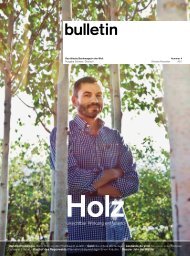Change
Solutions for a better world Global Investor, 01/2017 Credit Suisse
Solutions for a better world
Global Investor, 01/2017
Credit Suisse
Create successful ePaper yourself
Turn your PDF publications into a flip-book with our unique Google optimized e-Paper software.
GLOBAL INVESTOR 1.17 —15<br />
What are the main challenges to<br />
the system?<br />
Martin Eichler Apart from the stress on<br />
the financial markets in the short term, the<br />
main challenge at the moment is a convergence<br />
of three different factors. The first<br />
is baby boomers, who are now approaching<br />
retirement. The burden they represent is<br />
temporary (although it will last for about 30<br />
years), but it’s substantial. And it’s particularly<br />
hard for the AHV system, the payas-you-go<br />
part. Initially, the baby boomers<br />
put more money into the system than they<br />
took out, which actually was a double-edged<br />
sword in the sense that it masked other<br />
challenges to the system.<br />
Such as …?<br />
Martin Eichler Despite Switzerland’s<br />
high level of immigration, we are facing a<br />
declining population. At the moment, the<br />
population is still rising, but at a fast dropping<br />
rate. Our birthrate is substantially<br />
below the 2.1 children needed to maintain<br />
the size of the population. Already in the<br />
medium term, all the projections point to a<br />
declining population. It may take 10 or<br />
15 more years, depending on migration, until<br />
we reach the tipping point. But it will certainly<br />
happen. To illustrate the problem:<br />
according to a back-of-the-envelope calculation,<br />
it would take about 100,000 additional<br />
net migrants every year of 20-year-old people<br />
to keep the old-age dependency ratio stable.<br />
That would be politically impossible,<br />
wouldn’t it?<br />
Martin Eichler Yes. It means more than<br />
doubling net migration every year. It’s also<br />
very difficult to attract that many people.<br />
Remember that other countries around us<br />
are also facing declining populations as well.<br />
In any event, it’s not a solution. Migration<br />
can help, but it’s not enough to solve the<br />
problem.<br />
And the third challenge?<br />
Martin Eichler Increasing life expectancy.<br />
Not only are we getting older, we’re<br />
also healthier and stronger. That’s great,<br />
but it puts pressure on the pension system<br />
in that pensions are paid out for longer.<br />
What role does the low-interest-rate<br />
environment play in the challenges to the<br />
pension system?<br />
Martin Eichler It’s difficult, of course,<br />
especially for the capital-based pillar.<br />
But we see that as a temporary effect. It<br />
might well last for another few years;<br />
however, we do expect the situation to<br />
normalize at some point.<br />
Martin Eichler<br />
is chief economist and member of the<br />
board of directors of BAK Basel<br />
Economics AG. He heads up BAK Basel’s<br />
analysis and forecasting, and consults<br />
both within Switzerland and abroad.<br />
He studied Economics at the University<br />
of Constance, Germany, and at the<br />
University of Western Ontario, Canada.<br />
“Particularly for millennials<br />
and other younger<br />
generations, the question<br />
is how long we wait to<br />
react. The longer we wait,<br />
the harder it will hit!”<br />
Martin Eichler<br />
So what is to be done?<br />
Martin Eichler Particularly for millennials<br />
and other younger generations,<br />
the question is how long we wait to react.<br />
The longer we wait, the harder it will hit! We<br />
do need migration to cover some of the<br />
stress in the system, and higher contributions<br />
to social security are inevitable. Furthermore,<br />
I believe that at some point we will have to<br />
increase the pension age in Switzerland. With<br />
a mix of actions the system can be saved<br />
if we – including the citizens, who will have to<br />
vote on it – want to save it.<br />
What impact do you expect the<br />
changing nature of work to have on<br />
the pension system?<br />
Martin Eichler With less stable kinds of<br />
employment, longer periods of education<br />
or self-employment for example, we probably<br />
need more flexibility, especially with<br />
the employer-backed second pillar. We need<br />
to ensure that different parts of a working<br />
life add up to a substantial pension without<br />
too many holes. But that doesn’t require<br />
a completely new system. I’m convinced that<br />
it can be achieved.<br />
Additional<br />
details<br />
on our map

















